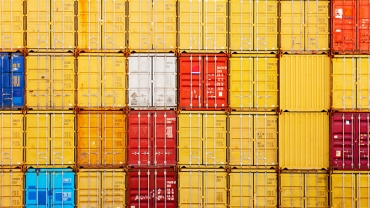
The Draft Law on harmonization of customs legislation with the European one and renewal of customs inspections is registered in the Verkhovna Rada
23/01/24
The Cabinet of Ministers of Ukraine registered in the Verkhovna Rada of Ukraine the Draft Law providing the renewal of customs inspections and further harmonization of the customs legislation of Ukraine with the European one.
The Draft Law No. 10411 dated January 16, 2024 "On amendments to the Customs Code of Ukraine on the implementation of certain provisions of the Customs Code of the European Union" (hereinafter - the "Draft Law") is developed in pursuance of the Action Plan for the implementation of the Association Agreement between Ukraine, on the one part, and the European Union, the European Atomic Energy Community and their Member States, on the other part, which aims to introduce European practices and standards in the customs affairs in Ukraine, to approximate the national customs legislation according to the European Union, and also to clarify certain provisions of the customs law.
First of all, it is proposed to renew from March 1, 2024 documentary inspections of compliance with the requirements of the Ukrainian customs legislation, including the timeliness, accuracy, completeness of the calculation and payment of customs duties. Additionally, the Draft Law introduced a new approach to the formation of schedules of documentary inspections based on established risks, regulation of the frequency of such inspections, as well as the possibility of sending documents related to the inspection by customs in electronic form.
Also, this Draft Law aims to regulate the issues of obtaining the status of an authorized economic operator (hereinafter - "AEO") and simplifications. The key provisions in this part are related to the changes in the approach of assessing the financial standing requirements of companies for replacement of the system of fixed ratios, as well as the procedure for using the simplification "local clearance procedure" .
Therefore, if the Draft Law is adopted, companies should demonstrate that their financial standing is sufficient to fulfill their obligations during the calendar year in which the assessment is carried out and the three previous years, taking into account the type and scope of their commercial activities. It is also required to have no negative net assets, unless they can be covered.
The authorization for the "local clearance procedure" simplification can be obtained and used only by companies- that are holders of the authorized objects that will be indicated in the authorization.
Government officials propose a new approach to placing goods in certain customs regimes (temporary import/export, processing outside/in the customs territory, end-use procedure), which currently requires obtaining prior permission:
- obtaining authorization on the basis of the submitted application (replaces the usual permissions)
- obtaining authorization based on the submitted customs declaration (intended for minor transactions).
In the authorizations, based on the application, the customs authority will determine the period for placing goods in customs regimes up to 5 years. At the same time, the obligation to submit a report to the customs authority on the completion of the customs regime in the case of placing goods in customs import regimes (in terms of the end-use procedure) or processing in the customs territory is introduced.
A new approach to the movement of goods without placement under the customs regime of transit has been proposed. Goods under the customs regimes of import (in terms of the end-use procedure), temporary import, customs warehouse, processing in the customs territory can be moved from one place to another on the customs territory of Ukraine without applying customs formalities to them in the next cases:
- movement of goods between different storage locations of goods that are specified in one authorization
- movement of goods from the customs authority that released the goods into the customs regime to the storage location of such goods
- movement of goods from storage locations to the customs border crossing point of Ukraine or to any customs authority specified in the authorization.
The Draft Law defines the responsibilities of customs authorities to make decisions on the granting of authorizations for the activities according to the Article 404 of the Customs Code of Ukraine:
- the State Customs Service of Ukraine (customs brokerage activities)
- the customs authority in the area where the company's facilities and the free customs zone are located (operation of the customs warehouse, temporary storage warehouse, free customs zone; placing goods in customs import regimes according to the procedure of end-use, processing in the customs territory)
- the customs authority that releases goods into the customs regime (placement of goods in the customs regimes of processing outside the customs territory and temporary import).
Additionally, the Draft Law stipulates that companies may use the obtained permits for customs brokerage activities, opening and operation of customs warehouses and temporary storage warehouses within 18 months from the date of entry into force of the Law. The newly developed criteria and conditions for obtaining authorization to conduct customs brokerage activities include, but are not limited to, compliance with the requirements of the customs and tax legislation of Ukraine, absence of criminal prosecution, presence of an employee responsible for customs matters with the obligations to take measures to prevent transactions with goods and/or companies subject to sanctions in accordance with the Law of Ukraine "On Sanctions".
Within the specified period, companies will need to obtain the above mentioned authorizations or they will be excluded from the relevant register and submitting of customs declarations by such customs brokers will be prohibited.
The legislator proposes new terms ("customs representative," "owner of the goods," "declaration of temporary storage," "authorized object," "objects of the company") to bring the concepts in line with the terminology of European legislation.
The Draft Law summarizes and details a single list of ordinary operations for goods placed under customs regimes of a customs warehouse, processing in the customs territory, processing outside the customs territory, free customs zone, as well as in other cases provided for by the Customs Code.
The implementation of "customs representative" institute provides the possibility to appoint an authorized person to perform the necessary actions and customs formalities for direct and indirect representation:
- with direct representation, the customs representative acts in the interests and on behalf of the person he represents
- with indirect representation, the customs representative acts in the interests of the person he represents, but on his own behalf.
The customs representative will have the right to declare goods in the interests of another person in case of obtaining the authorization to carry out customs brokerage activities, and will have the same duties, rights and responsibilities as the declarant.
The Draft Law proposes to set out in a separate article the procedure for bringing to administrative liability for the movement of goods across the customs border of Ukraine in violation of intellectual property rights.
It is also proposed that during the period of martial law, the waiting time for crossing the border by commercial vehicles transporting goods outside the territory of Ukraine should not be included in the time of transit procedure in case of informing the customs authority that controls the transit movement of these goods.












